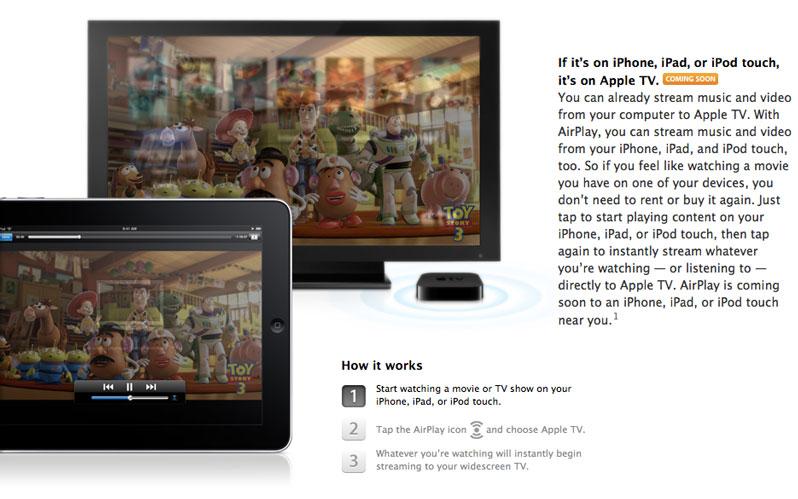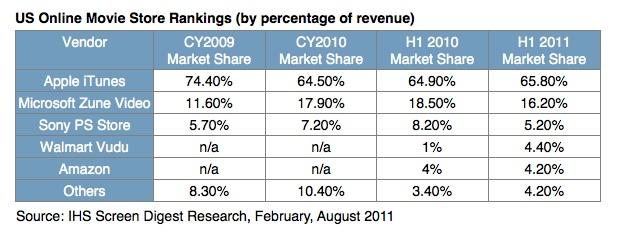AirPlay credited with winning Apple movie market share in iTunes
Despite Apple's tiny increase in market share, growing from 64.9 to 65.8 percent in the first half of 2011 over the same period last year, "iTunes experienced the largest revenue increase growth among all online movie providers during the first half," noted research firm IHS iSuppli.
“Much of iTunes’ success can be traced to the rising usage of Apple’s AirPlay system, which allows wireless video streaming to consumer electronic devices including televisions. This has expanded the reach of iTunes to new platforms, boosting sales of movies from the system.â€
IHS added "other factors that enhanced iTunes’ share included the growing installed base of the iPad and price promotions."
Survival of the fleetest
Last year, Apple's share of movie downloads fell from 74.4 percent to a 64.5 percent, according to data reported by IHS. That drop reflected a 60 percent expansion of the online movie market, as iTunes began competing with Microsoft's Zune Video store and Sony's PlayStation Store, alongside WalMart's acquisition and promotion of Vudu.
The successful launch of Microsoft's Xbox Kinect motion controller helped give it a bump in 2010, with Microsoft gaining 6.3 percentage points in the face of Apple's loss of ten.
However, over the first six months of 2011, Apple has regained a percentage point as Microsoft's video marketplace dropped by more than two. IHS noted that while Kinect helped improve sales of the Xbox, "which can access movies on the Zune Video Marketplace" the "impact of the surge since has dwindled, causing Zune’s share to decline."
Sony's share of the online movie market has done even worse, dropping in share from 8.2 to 4.4 percent and ending up with less share than it had in 2009. IHS blamed Sony's losses on competition from Vudu as well as the security problems that caused Sony to shut down its PlayStation network during the period.
Walmart's Vudu jumped from 1 percent share to 5.3 percent, leveraging a "shrewd device strategy, a good customer experience, a compelling user interface and its $1/$2 rental pricing system."
Amazon, which took direct aim at iTunes, only managed to grow its share of online movies from 4 percent to 4.2 percent.
IHS said the "new release on-demand" online movie business is "all about iVOD (internet Video on Demand)," noting that In the current economic climate, consumers are more interested in accessing movies than in owning them."
For this reason, the firm says that growth in EST (electronic sell through, or paid downloads) "has virtually stopped. Whatever small EST growth that is happening is coming from aggressive sales on iTunes, as well as discounting across major services."
IHS' figures don't include subscription services such as the popular Netflix plan, which allows users to pay a recurring fee to either mail back DVDs or, as the company has recently focused upon, download unlimited movies from its streaming catalog.
 Daniel Eran Dilger
Daniel Eran Dilger















 Amber Neely
Amber Neely
 Thomas Sibilly
Thomas Sibilly
 AppleInsider Staff
AppleInsider Staff
 William Gallagher
William Gallagher
 Malcolm Owen
Malcolm Owen
 Christine McKee
Christine McKee










24 Comments
It would be interesting to see what actual downloads when factoring in Netflix' streaming and Amazon Prime member (free streaming) are compared to these folks.
Airplay is wonderful and was well worth the wait. It's fun to "wow" the uninitiated.
If you are using AirPlay, you have an AppleTV (if there are any non-AppleTV AirPlay video capable devices out there, they are a very small percentage). And if you have an AppleTV, why would you first rent a movie on your iPad/iPhone and then AirPlay stream it? Wouldn't you just rent the movie directly on your AppleTV?
The bump in movie sales is likely more due to people simply watching the movies directly on their iPads (or even just using the HDMI adaptor if they don't have an AppleTV). I think analysts like to tie their conclusions into some catch phrase or a particular technology (AirPlay, in this case), even if it's an unsupported linkage. Simply saying, "Apple has sold loads of iPads and people are watching movies on them" isn't sexy enough.
Airplay is wonderful and was well worth the wait. It's fun to "wow" the uninitiated.
AirPlay is cool and very useful. But would you watch an entire movie that way vs. just watching it directly from your AppleTV (either streaming from Apple or from your iTunes library)? Just curiuos if that's how you use it.
If you are using AirPlay, you have an AppleTV (if there are any non-AppleTV AirPlay video capable devices out there, they are a very small percentage). And if you have an AppleTV, why would you first rent a movie on your iPad/iPhone and then AirPlay stream it? Wouldn't you just rent the movie directly on your AppleTV?
The bump in movie sales is likely more due to people simply watching the movies directly on their iPads (or even just using the HDMI adaptor if they don't have an AppleTV). I think analysts like to tie their conclusions into some catch phrase or a particular technology (AirPlay, in this case), even if it's an unsupported linkage. Simply saying, "Apple has sold loads of iPads and people are watching movies on them" isn't sexy enough.
Yep, this does not compute. AirPlay is cool for gaming. But when many (or most) mid to high-end modern TVs are internet enabled with apps for Netflix, Hulu+, or connected to iTunes I see no compelling reason to use AirPlay to watch a movie.